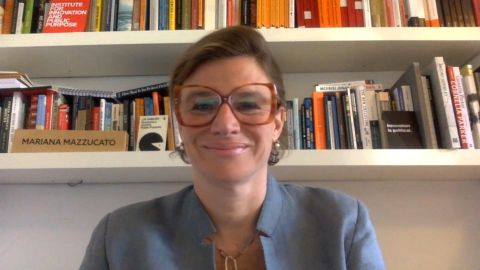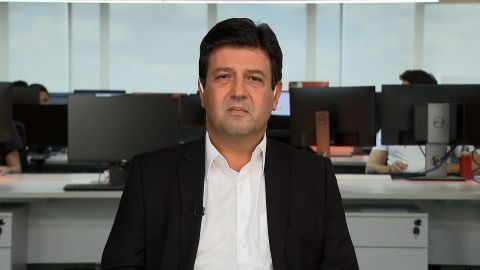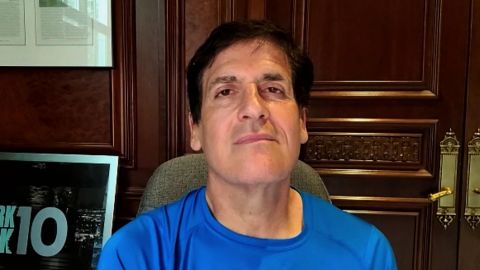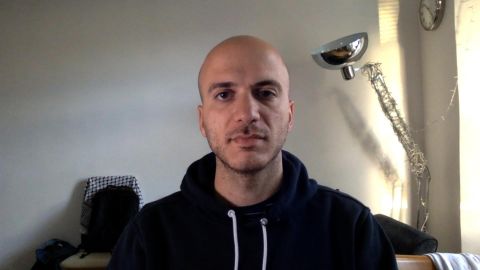Read Transcript EXPAND
CHRISTIANE AMANPOUR: But, first, many of us are really looking forward to the return of professional sports to our lives and to our screens. And so too are the moneymaking giants behind some of the biggest American teams. But the question is how to get players back out there as safely as possible. Mark Cuban owns the NBA’s Dallas Mavericks, and he says they have no immediate plans to reopen practice arenas. Billionaire investor and star of the TV show “Shark Tank,” he is also an adviser on President Trump’s new economic panel. He’s joining our Walter Isaacson to talk about the challenges faced by American businesses right now.
(BEGIN VIDEOTAPE)
WALTER ISAACSON: Thank you, Christiane. And Mark, Mark Cuban, welcome to the show.
MARK CUBAN, OWNER, DALLAS MAVERICKS: Thanks, Walter. Thanks for having me.
ISAACSON: And you own the Dallas Mavericks. What are you looking for when you and the other owners and Adam Silver have to decide whether to open up the NBA?
CUBAN: Safety. I mean, we’re not going to put our players, we’re not going to put any essential personnel or anybody at risk, not that we can eliminate risk entirely. But we’re going to do our best. I’d like to think we will use the White House protocol, since that’s probably — they probably had the best source of information and science available to them. Probably the steps that they take are the steps I’d like to see taken for our players.
ISAACSON: So, the White House, they test people every day. Would you want to be able to test you employees, everybody there every day in an ideal world?
CUBAN: Well, it just depends on the circumstances, obviously. There’s some employees that just may work from home. And it depends on, are they taking public transportation, what they feel, how they feel about things. There’s civil rights issues. It’s got to be something we all come to an agreement on. But if it’s a noninvasive test that’s easy with quick results, and readily available, so we’re not taking it away from those in need, yes, I’d like to test them every day.
ISAACSON: You hired secret shoppers, people who go around to businesses that were reopening in the Dallas area, where you are. What did you find?
CUBAN: What I found was that only 36 percent of businesses even opened up, which kind of surprised me. I thought it’d be a lot more. I found that it was difficult for the small businesses to invest in the tools and the changes that are needed to enable social distancing enable supporting the protocols that were recommended by the CDC and the state. I found that, as we talked more after the fact, there’s a lot of confusion how even they can use the PPP money. One of the challenges is, you can’t use the PPP money and get reimbursed if you use it to upgrade your facilities, your location, your retail. And so I found a lot of frustration on the part of business owners.
ISAACSON: Why did you do it?
CUBAN: Because I’m curious, right? I mean, I want to know what’s going on. I mean, as I said earlier, I believe in data. And so the more information available, the better the decisions I can make for myself, my businesses, my family. And, remember, that creates a baseline. It wasn’t meant to be a final determination. It wasn’t meant to be — we didn’t release any names, so it’s a completely anonymous survey.
ISAACSON: Of the businesses your secret shoppers went to see, what were the problems? Were they complying with health regulations, social distancing, wearing masks?
CUBAN: I mean, the greatest issues were compliance with some of the more detailed things, not removing everything from a table in a restaurant, so that they can properly clean it, not having masks on all employees. But, again, I think that — those are the types of things that over time will be rectified, which is why we’re going to survey again. And we will see what happens.
ISAACSON: If you had been governor, if you were the president, do you feel that’s something that the government should be doing?
CUBAN: Yes. I mean, I think we need to be more informative. The White House, the federal government should have access to the best information, the best data, the best scientists, the best doctors, hopefully, and we should be sharing the best methodologies for getting back open. Being in my role with the open economy council, they assigned a liaison to me. And, just yesterday, I sent him an e-mail asking, what’s the process to try to get the Treasury to allow small businesses to get PPP loans to use part of that funding to upgrade their businesses where they need to make it as safe as possible and adhere to those protocols, and not get penalized in — by having it not be reimbursed? And so there’s a lot of things that I would have done just differently.
ISAACSON: You talk about the PPP loans, the payroll protection things that are supposed to go to small businesses, so they don’t have to lay people off. And you kind of imply that the banks are doing it in not a very careful, a very methodical way. How would you change that?
CUBAN: I would have done an overdraft protection program. Look, the goal — the amazing thing that happened with PPP is that it was passed very quickly. The unfortunate side of it was that it was funded very lowly. And it was a timing issue that was most important. And so we needed to have companies feel like they can continue business as usual and retain their employees. But that delay from the time the program was approved to the time when businesses were funded or not funded, and we had to get to a second tranche, that created a lot of problems. And what I would have done is allowed companies to continue friction-free with the way they were doing business, but provide for overdraft protection, so that you couldn’t bounce checks for any payroll or specific business-associated expenses. And then the banks who were funding those overdrafts would be made whole by the Fed on a daily basis. That would allow businesses to continue doing business as usual, retain their employees. And I think that would have created more confidence by employees that they were going to be able to keep their jobs. All this delay and everything just created so much confusion that now still a lot of those recipients of PPP are in a state of suspended animation. They don’t know how to spend their money.
ISAACSON: What should they do now? If the president and his counsel that you’re on was asked, how should we fix this mess, what would you say?
CUBAN: First thing, you got to get data, right? You can’t just wing it. Whether it’s the White House or there’s new programs now trying to come from the Democrats that are trying to emulate what happened in Europe, that’s — it’s too late to do that. We need to talk to small businesses and find out exactly where they are. And, number two — and I think this is even more important — we need to stimulate demand, consumer demand, because unless people are confident that they have jobs, they’re not going to spend money on anything but rent, essentials and basic expenses. They’re not going to spend on the random things, and they’re going to save too much money on, and so the economy won’t have the demand side that we need. And two-thirds of GDP is customer — consumer demand.
ISAACSON: And so how do you stimulate consumer demand?
CUBAN: You create a jobs program. We have never seen anything like this before, 30-plus million jobs lost in two months, you know, another 20-plus million underemployed or losing hours, so 50 million, give or take, that are in a precarious situation. The only way we’re to start to chip away at that is by creating a federal jobs program. And we have things that we need, tracking and tracing. We talked about testing. You can train people to do those jobs, deal with HIPAA compliance, et cetera, so they can do that job. We have a population, not just elderly population, but a population of people that have preexisting conditions that are going to be hesitant to go out and use resources. Hiring and training people to support them and help them in every community across the country, that’s millions of jobs that we can create that we can pay $30,000 or more, give them health care benefits, because we haven’t even started to talk about health care and the problem there. Because the less people feel confident that their health is going to be taken care of, particularly since people are avoiding the hospitals and avoiding doctors right now, or they may be closed, until we started taking care of the job security and health care security, people are not going to spend money. But we’re not addressing either of those issues right now.
ISAACSON: But what you’re talking about seems to be a pretty massive expansion of the federal government’s size and role in the economy. What type of pushback do you get, if any, from the Trump administration and the people on this council?
CUBAN: Actually not that much. I mean, I don’t think they’re taking it — when I mention it to them, I don’t think they’re taking it seriously. So they haven’t pushed back a whole lot. But I will keep on pushing, because I don’t think we have a choice. We’re not — private — historically, we have looked at private business to create jobs. And I have been a big fan of that. Historically, we have looked at trickle-down economics. And it’s an easy argument to say why that hasn’t worked out well for the bottom. But we — historically, we have never had 50 million people effectively unemployed or underemployed and had that created in two months. And desperate times call for different, if not desperate measures, and that’s where we are now. So, we’re going to have to take different steps. And all dogma, all partisanship has got to be discarded immediately.
ISAACSON: You have never been, if I’m correct, a big fan of unions.
CUBAN: No.
ISAACSON: Has this help changed your perspective?
CUBAN: Yes, I don’t think there’s any question. I mean, now we’re — historically, unions — well, it depends on where. If you go back to the ’20s, unions had their need. I mean, I read Upton Sinclair in school, like everybody else. But over the last 20 years, I haven’t been as big of a fan. I’m not against them. I’m just not a huge fan. But now we have got to make sure that employees are taken care of, because we’re — again, unique circumstances. We — this needs to be bottom up. We need to make sure that employees are taken care of, that they’re compensated correctly, that their health care is taken care of correctly. In a perfect world, employers would do that automatically. And for an organization where they’re taken care of, maybe there’s not a need for unions. But where there are scenarios like we have seen with meatpacking plants, where people have really put employees’ health at risk and haven’t taken the precautions necessary, absolutely there’s the need for unions.
ISAACSON: Are you still paying your hourly workers who can’t be coming into work?
CUBAN: We pay — I’m paying all of our Mavericks employees. And so, for the arena employees that were paid per game, we paid them through the end of the regular season. But we also partnered with an organization. What is it — it’s called GetShiftDone.org or .com. And what — then we contributed money for that organization. And what they did was, they go to nonprofits and other organizations who need people to come in and work by the hour. And this app — people who need our hours for work download the app, and it notifies them. And so I donated money to create hours for our employees and anybody, for that matter, to be able to pick up hours and make some money.
ISAACSON: If you were advising medium-sized businesses, big businesses, would you tell them, avoid layoffs?
CUBAN: If they can afford it, of course. There’s a bigger picture here. If — and no business survives without consumer demand, and, obviously, there’s a cascading issue. So, yes, if you can afford — Salesforce.com, Bank of America, there’s a lot of companies that are really stepping up from an employment perspective. And that’s going to be important. And the bottom line is, those companies who don’t take care of their employees, their brands are going to be destroyed. I mean, they will be talked about forever as examples of what not to do.
ISAACSON: You want to give me some examples?
CUBAN: No. I’m not trying to throw anybody under the bus. Look, this is hard for everybody. Walter, it comes down to this. This is the thought process every American is making right now. Who do I trust with my life? Because decisions I make for myself, my family, my employees may potentially be life or death. And even, if not death, the impairment, we haven’t ever even discussed the impairment rates, blood clots, heart, kidney disease, neurological problems. We — that’s not even part of the discussion or risk profile. And so who do I trust with my life? And we’re not — we don’t have that person right now. There isn’t somebody or a group or organization that we just point to and say, you know what, I know the data from there, the recommendations, the ideas coming from them are well-thought-out, well-planned, and I’m going with what they say. That’s a real challenge right now. And that’s why I don’t want to throw anybody under the bus.
ISAACSON: Should that be coming from the president?
CUBAN: Be coming from the White House, if not the president, then somebody he assigns.
ISAACSON: And so do you feel that has happened?
CUBAN: No, not at all, not even a little bit. And that’s the problem.
ISAACSON: Explain that more. Why has it been a problem? And what should be done?
CUBAN: I mean, like I said, we’re all asking ourselves a very basic question. How do I protect my family? And to answer that question, you have to ask, who do I trust with my life? What sources of information? And the hope would be that that comes from the president. And, to his credit, at the beginning, he tried. That’s how we met Dr. Fauci, and that’s how we met Dr. Birx. And he deferred to people. But, more recently, it’s been just a crap show of, everybody else is to blame, and every other topic. And there’s just — there’s nothing that’s being said or done right now to — that gives me or I think anybody confidence that this is who we need to trust. I mean, you have Dr. Birx saying — being condescending towards the CDC. You have people saying, the CDC is changing data, and there’s just nobody that’s standing up and saying, no, these are the facts, this is what you can trust, this is what’s happening right now, this is what we recommend. I think the economy would rebound more quickly if we had more confidence in our leaders.
ISAACSON: So, do you think that the political people in the White House are making this too much of a partisan issue, unlike the Dr. Faucis, who are trying to keep it based on the science? And are they looking and is the president looking more to his own political survival, vs. just trying to be a straightforward, effective communicator?
CUBAN: I think all politicians are making this too political. I mean, when you hear the president speak, it’s always, the Democrats this, the Democrats that, Obama this, Obama that. And when you hear Chuck Schumer speak, it’s, the Republicans won’t let us do this, the Republicans won’t let us do that. This is what — this is where leaders need to become leaders and get beyond it. They were able to do it for the CARES program. And I thought, oh, my goodness, maybe we’re getting past at least part of the partisanship and dogma. But, again, do I think the president is doing a good job? No. Do I think Schumer is doing a good job? No. Do I think Pelosi is doing a good job? No. Do I think McConnell’s doing a good job? No. Any single one of them could stand up and show any level of leadership, and I think they would get a lot of people behind them.
ISAACSON: And do you think we have also lost the leadership ability globally?
CUBAN: Yes, that’s gone. Yes, we’re no longer leaders. Now, it’s — again, four years — it’s four years, not a lifetime. And so I think that it’s reclaimable, but we have got to — we have got to recognize that, particularly dealing with a pandemic like this, this is a global issue, and we’re global citizen, and we’re getting into the habit of trying to place blame. One of my friends asked me a simple question. What if China invents the vaccine first? Are they going to give it to us? And not because they’re bad people. That’s not what I think at all. I think just the disharmony, the conflict that’s been created at a government level, are we going to — if we come up with it first, are we going to share it with them? I mean, that’s terrifying, when you think about it, that it’s just not obvious that anybody who comes up with a vaccine should share it with the world immediately. And that’s what we should be saying. Hey, world, we’re all in this together. From what I read, we have brought in scientists from around the world to work together to help solve this. Let’s make it clear that this is — whoever solves it, whether it’s us or anybody else, or whether it’s a coalition that solves it, that whatever we come up with is made available to everybody in the world, because, otherwise, we’re segregating the world, and they may decide to segregate us and work together. We’re able to rebound from this because the United States’ dollar is the reserve currency for the world. If we lose that, yes, I mean, there’s just — we need changes. We need people to think differently.
ISAACSON: What type of companies would you like to see pitched on “Shark Tank,” your show, coming out of this pandemic?
CUBAN: We’re basically starting with a blank slate on what America 2.0 can be. And there’s going to be entrepreneurs out there who have amazing ideas that I don’t even — I can’t even conceive of right now. And that’s exactly what we need. You know, 20 years, 25 years from now, whatever it is, when we look back to the pandemic of 2020, I think we’re going to recognize that there were five, 10, 20, 25 or more world-class companies that basically changed the world that were created as a result. And those are the companies I want to see. Hopefully, I’m smart enough to invest in them.
ISAACSON: Thank you very much. It’s been great to be with you again, Mark.
CUBAN: Always, Walter. I always appreciate it. Thank you.
About This Episode EXPAND
Brazil’s former Health Minister assesses President Jair Bolsonaro’s response to COVID-19. Economist Mariana Mazzucato discusses what global economies will look like after recovering from COVID-19. Mark Cuban discusses the NBA, reopening small businesses, and U.S. leadership. Syrian refugee Hassan Akkad explains why he is working as a cleaner in a London hospital ward to fight COVID-19.
LEARN MORE



